What Can You Put In A Dumpster? (Find Out Now!)

When you think of a dumpster, what comes to mind? For many people, it’s an image of overflowing garbage in the street, but there are plenty of items that probably shouldn’t be there. What can you put in a dumpster?
Items suitable for disposal in a dumpster include bulky furniture, construction debris, landscaping waste, and some appliances. Avoid throwing out hazardous liquids and materials, flammable items, and electronics. If you’re unsure what’s acceptable, contact your local waste management company.
Follow along to learn what you can and can’t throw in a dumpster. We’ll also discuss if it’s okay to dump stuff in any commercial dumpster or if you should rent your own!
Do You Need a Dumpster Rental Service?
Get free, zero-commitment quotes from pro contractors near you.

What Items Can You Put in a Dumpster?
Most people assume it’s okay to put just about anything in a dumpster. Unfortunately, that’s not the case- knowing what you can and can’t dump will help protect you, waste management workers, and the environment.
Before we get into what you can’t toss in a dumpster, let’s go over what you can.
List of acceptable items to throw in a dumpster include:
- Household garbage
- Bulky furniture
- Appliances
- Landscaping waste
- Housing material
- Construction debris
Household Garbage
Generally, this rule applies to anything that isn’t recyclable.
Things you’d typically throw in your kitchen garbage can like paper towels, tissues, and other daily trash items are acceptable.
The exception here is food- some dumpsters allow you to throw minimal amounts of food waste inside, but a bunch of leftover scraps may get you fined.
The reason for this is that a bunch of rotting food sitting outside will attract bugs, rodents and stink up the surrounding areas. Dumpsters aren’t always emptied every week as your home’s garbage can is, so these odors can build up.
Bulky Furniture
Big furniture that you’d rather not schedule a “bulky item pickup” for, like tables, chairs, and consoles, can be tossed in the dumpster.
Some counties even allow you to throw out your mattress or other upholstered goods; it just depends where you live.
The best way to dispose of these items is to disassemble them as much as you can. That way, you can fit more things in the waste container!
Appliances
You might be shocked to learn that it’s admissible to put appliances in the dumpster.
Refrigerators, freezers, A/C units, washers, dryers, microwaves, and more can be thrown away safely. The key here is to make sure there aren’t any hazardous substances left inside.
For example, A/C units often contain freon, a non-combustible gas that is used as a refrigerant. It’s odorless and tasteless but can be harmful to the skin and lungs in large quantities. Be sure to dispose of this first!
Related Guide: How To Get Rid Of An Old Gas Grill?
Landscaping Waste
Any biodegradable material you trim from your yard can also be disposed of in a dumpster.
This covers leftover items such as tree or plant debris, large branches, dirt, or mulch- anything that’s too big to go in regular garbage cans.
However, some cities only allow a certain amount of outdoor waste to be thrown in a dumpster. There are many ways you can recycle this material! Additionally, there’s usually a “yard waste collections” company you can call to come to get strictly organic trash.
Housing Material
Housing material is a broad group, so let’s get specific.
Material like wood, drywall, siding, concrete, brick, stone, and asphalt can easily go in an industrial-sized dumpster. Just pay attention to the weight limits of your container. A few bricks can quickly add on a lot of extra poundage.
Hold off on throwing out paint or stains. We’ll get to that part next.
Construction Debris
Construction waste includes wood scraps, insulation, and siding.
Almost everything (with some exception) that’s leftover when a construction project is completed can be thrown in the dumpster.
Just make sure there aren’t any hazardous liquids or materials left behind. If you are unsure about an item, it’s best to call waste management services or your dumpster provider.
Now that we’ve got the easy stuff out of the way, let’s move on to what you shouldn’t put in a dumpster.
What Items Can’t You Put in a Dumpster?
The items below may seem like common sense, but you’d be surprised how frequently people try to throw these things out.
Here are the most common offenders:
- Paints, stains, and lacquers
- Hazardous liquids and materials
- Flammable items
- Tires
- Electronics
- Food waste
Paints, Stains, and Lacquers
Tossing paints, stains, or lacquers in the trash is illegal and dangerous.
This also includes throwing them down the drain- even “water-soluble” paints will clog up your pipes! The best thing to do is take paint to a special drop-off location designated by your city.
The only way it’s safe to put paint in a dumpster is if it’s completely dried out.
Hazardous Liquids and Materials
Other dangerous materials that most definitely can not be thrown in a dumpster are:
- Chemicals
- Batteries
- Asbestos
- Medical Waste
Just don’t do it; it’s free and easy to find a hazardous materials drop-off location near you.
Flammable Items
NEVER put something that could catch on fire in a dumpster.
Brutally hot days could cause things like fuel, oils, and propane tanks to ignite. On that same note, it’s also important not to put anything hot into a dump.
A recently-used curling iron, hot wax, or burnt food are all huge no-nos.
Tires
Tires might be recyclable, but they definitely don’t belong in the dumpster.
They can trap methane gases and, overall, just take up too much space.
There are special places to dispose of or reprocess tires into something new, so please consult your local waste management services.
Electronics
Televisions, computers, and cell phones are just a few types of electronics that can’t go in a dumpster for disposal.
In fact, you may be able to sell old or broken devices for cash. Places like Best Buy or Amazon take used electronics for their parts and to refurbish them.
Food Waste
Last but not least, food waste is one of the biggest contaminants when it comes to dumpsters.
It smells bad, and it’s a breeding ground for pests. Rotting food, meat, seafood, and dairy products are especially pungent.
If you have a lot of food waste, start composting!
Can You Use Any Dumpster?
Even if dumpsters look open to the public, that’s not always the case.
Throwing out waste on private property, such as in dumpsters or containers behind commercial or residential buildings, is forbidden unless the owner allows it.
Sometimes big stores like Walmart or Costco have several massive dumpsters behind their locations- this isn’t an invitation for you to use them. Usually, they’re locked or have surveillance cameras to ensure unverified personnel aren’t dumping personal items inside.
Your best bet is to call a service to have hazardous or otherwise large items removed from your property. If you’re taking on a big project and need continuous access to a dumpster, they’re available for rent!
Related Questions
Are dumpsters charged by the weight?
When you rent a dumpster, the fee typically includes the container itself (for a designated amount of time), delivery of the dumpster, the cost to dispose of your trash, and an allotted amount of weight.If you go over this weight limit, companies will charge you extra. The reason for this is that excess weight makes it difficult for their trucks to transport the dumpster and may require multiple trips.Additionally, landfills don’t want people to use dumpsters to dispose of extremely heavy items.
Will a dumpster damage my driveway?
Dumpsters are bulky and can cause irreparable damage if handled incorrectly.As long as a qualified company delivers your dumpster and places it properly, your driveway shouldn’t sustain any cracks or harm.
Is dumpster diving illegal?
One man’s trash is another man’s treasure.However, dumpster diving can be illegal in certain states. Before sifting through someone’s garbage can, read up on the rules of your zip code.
Do You Need a Dumpster Rental Service?
Get free, zero-commitment quotes from pro contractors near you.

In Summary
It’s important to know what you can and cannot put in a dumpster.
For example, electronics should be donated or recycled because they’re considered hazardous materials. The same goes for tires.
Wooden furniture, leftover construction material, and household garbage are generally acceptable to put in a dumpster, but it’s best to consult your local waste management company!
Related Guide

Emily is a copywriter with over five years of experience in crafting content for the home renovation and remodeling industry. She loves house projects, whether it be painting a room or tweaking small design elements to transform a space. Her favorite aesthetic is french modern because of its clean lines and airy feeling! When not writing, Emily loves to travel and check out architectural details all over the world.
More by Emily Carr



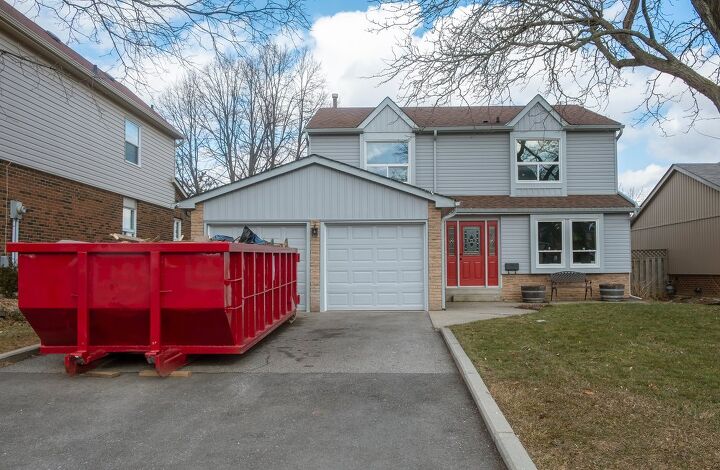






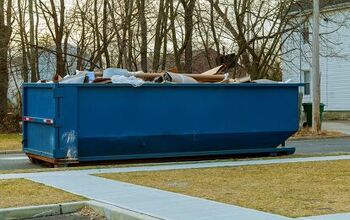
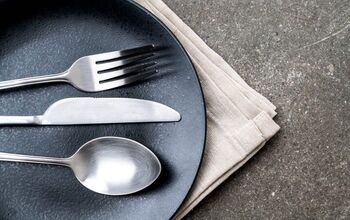
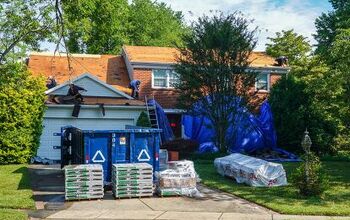
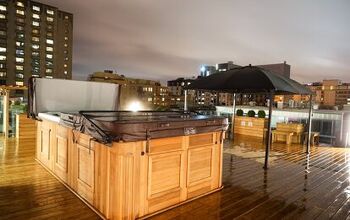
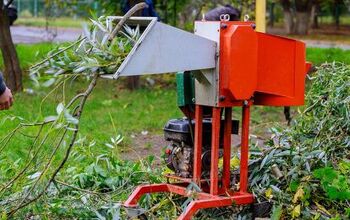
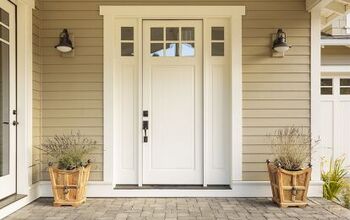

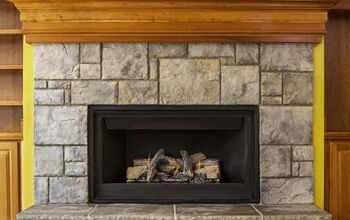

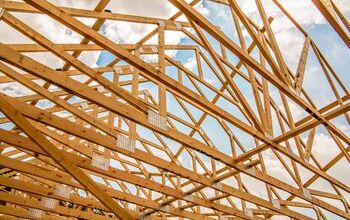
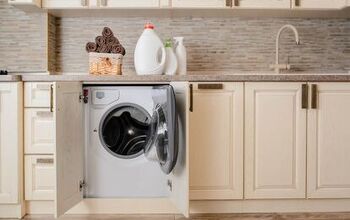
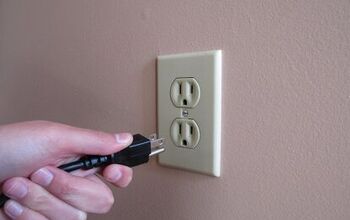




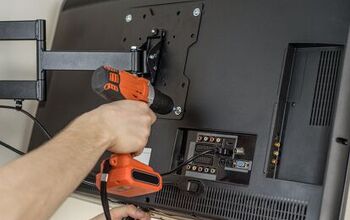
![10 Most Dangerous Neighborhoods in Baltimore [Updated]](https://cdn-fastly.upgradedhome.com/media/2023/07/31/9075655/10-most-dangerous-neighborhoods-in-baltimore-updated.jpg?size=350x220)